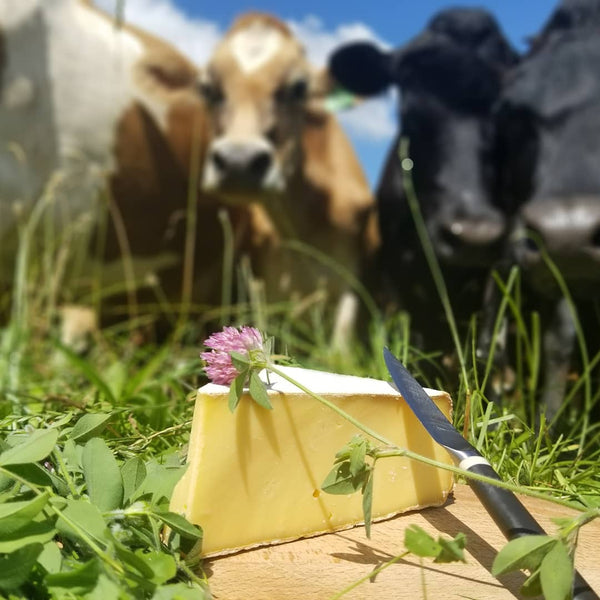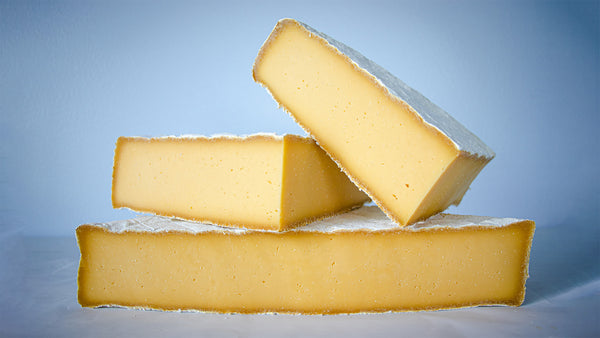
The Raw Milk Cheese of Meadow Creek Dairy
What strikes us most about Meadow Creek Dairy is that they produce only raw milk cheeses, three to be exact, in a tiny pocket of hills near Galax, Virginia just on the North Carolina border. They are a grass-based operation with 90% of the cow diet coming from grass. Remarkably they rotate their all-female herd of 140 cows every twelve hours to keep the menu fresh! They are a seasonal operation meaning that all the cows calve together in the spring (when the grass is at its lushest) and then are "dried off" and stop milking together in the winter (when the grass dies back). It's a sustainable system that matches the natural cycle of the cows to the natural cycle of the grass. In this lush area of the world bursting with underground natural springs, grass on any given field can grow back within three weeks, recreating quickly a perfect salad bar. We were lucky enough to spend two days with the twelve-person team this past week and were amazed to witness that at Meadow Creek they control every aspect of production from breeding to sales and everything in between including milking, cheesemaking, and aging. But what is most special is that the cheeses produced here are considered among the best raw milk cheeses in the nation.
Helen and Rick Feete are the matriarch and patriarch of the family, ex-hippies who moved out of the city to start a farm early in the timeline of the American artisan cheese movement. To this day Helen leads the cheesemaking operation while Rick picks up milk from the milking farm, delivering it to the production room, and checking on various parts of the farm along the way. Rick is an expert on the fast-growing grasses including: plantain which is a forbs, rye grass which is a perennial, and cloves. Moving the herd to the correct pasture just at the right moment, when the grasses are at their most palatable and nutritious for the cows, is an art. The only three cheeses produced with the milk of their closed herd are Mountaineer, Appalachian, and Grayson, all award winners and critically acclaimed by cheesemongers across the nation.
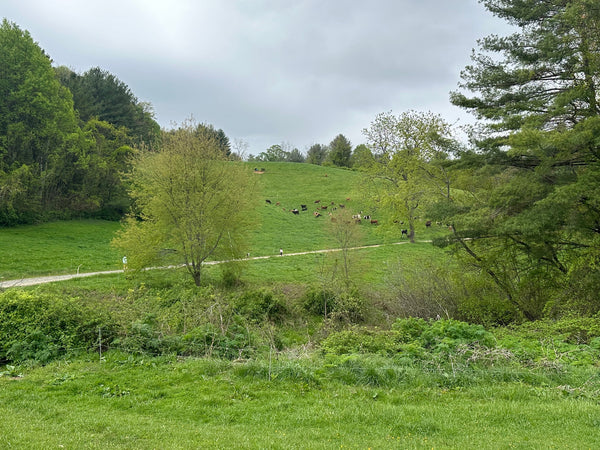
Seeing Helen and her team operate around the cheesemaking room is like watching a ballet of experienced masters, with absolute economy of movement. Time is of the essence as whey drops out of the cheese while it’s made — too long a delay and the batch will be inconsistent and not reach its full potential, especially with the soft and moist Grayson. Working with Helen is her daughter-in-law Ana and an apprentice hoping one day to open a dairy of her own, Lisa Lopez.
Kat Feete and Dan Zlotnikov make up half of the next generation at Meadow Creek. Kat is the general manager, a rover who oversees all aspects of production outside the make room while Dan runs logistics, including shipping. Of the thousands of wheels they produce each year, 5% goes direct to consumer, 46% goes to distributors, and the remainder is shipped direct to cheese shops and restaurants. Each of the farm’s three aging rooms are filled with a different cheese that must be monitored and flipped on a regular basis. The minimum aging time required for raw milk cheeses is sixty days. The Grayson is the youngest and ready in the minimum time required, while the Appalachian is aged for three to eight months, and the Mountaineer for six months.
Jim Feete and Ana Argello live on the farm with the cows just a couple miles away from the cheesemaking farm. Every day, once a day, Jim calls the herd to the milking room. When we were there, we saw the cows walking single file along a cliff on the hillside, down and around to the milking stations. It was a beautiful sight to behold and reminded us of the shepherding operations of old Europe. Within 90 minutes all 140 cows are milked and sent back out to a new field to dine on delicious grass.
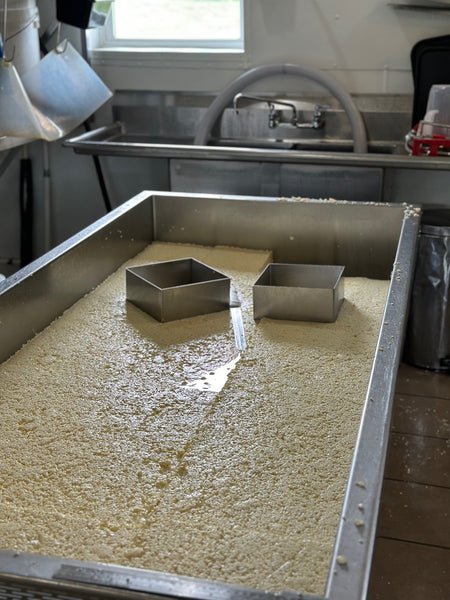
The Feetes have chosen to crossbreed their original Jerseys with two other breeds, aiming for a stable three-way cross — essentially a "Meadow Creek breed.” Each one offers an important component to the cheese once the milk is combined. The Jerseys are a common breed but on this farm they are 100% pure and they deliver a high fat content to the milk. Unfortunately, Jerseys can be fragile, especially as the farm requires them to walk up to a mile a day, so the Freisan breed was introduced from New Zealand bringing with it sturdy and robust grazing genetics. Montbeliarde was brought on for the protein it delivers thanks to an excellent protein to fat ratio.
Jim studied in New Zealand where he did hands on work in grassfed farming. The lessons he learned there were helpful to his work back home. In New Zealand the focus is on quality, not quantity. And because New Zealand produces so much milk, more than they can drink domestically, much of it is exported as powdered milk. The milk kept in New Zealand is used for drinking, but mostly for cheese and other value-added products which they have become quite sophisticated in producing, so they are truly experts in exactly the exact field of study that the Feete family was looking for.
The rest of the team includes other family members like Ellie (babysitter), two sons of Jim and Ana who spend time wandering and watching their mom produce cheese in the make room, and a team of local employees and apprentices including one member of the Anne Saxelby Legacy Fund coming this summer. Each and every day of the work week Helen cooks a sit-down family meal for the entire team. We feasted on pasta and goulash!
On the day we were there, they were producing the famed Appalachian tomme-style, semi-hard cheese. Their goal with this cheese was to develop a product that showcased their milk — milk from a herd developed to fit the farm’s mountainous terrain. They keep the cheese simple and focus on affinage, allowing the Appalachian to form a white coat of penicillium mold that compliments the unique flavor.
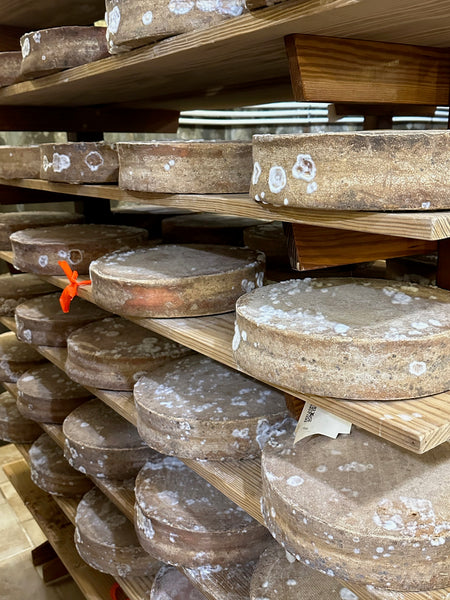
Appalachian is aged for at least four months and boasts a lush, vibrant flavor evocative of cream and butter, with a mushroom earthiness that recalls the intensity of the cellars. Its lemon notes shade to toasted as the cheese ages. We even detected notes of pineapple! The texture is velvety and melts on the tongue. While Appalachian is unique to the place where it is made, it can be likened in taste to the Tomme de Savoie in France and Toma Piemontese in Italy. It can be eaten alone and it melts beautifully, making it perfect for many dishes. The only ingredients used to produce it are cultured raw milk, salt, and animal rennet.
To store Appalachian keep it wrapped in its original wrapping in the fridge. Avoid prolonged storage in plastic wrap or other non-breathing material as this will kill the rind. Always let your cheese come to room temperature before serving for its full flavor to develop.
